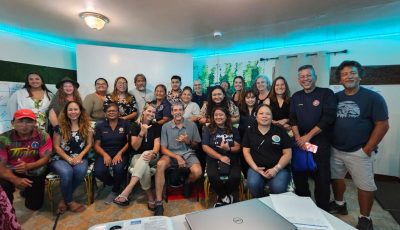CHCC board finds Walker denied due process
The Commonwealth Healthcare Corp. board of trustees ruled yesterday in favor of Dr. Grant Walker, after finding that the physician was denied due process when his medical privilege was terminated by the corporation’s governing body headed by CEO Esther Muña.
CHCC hired Walker from Idaho to serve as the hospital’s orthopedic surgeon for 30 days in October last year. Prior to his contract’s expiration, the governing body terminated his medical privileges due to a host of issues, including alleged unprofessional misconduct and insubordination.
Medical privilege allows a physician to use the treatment facilities of the public hospital for surgeries and operations. Losing this privilege, a doctor—whether in public or private clinics—cannot operate or provide services to his clients.
Yesterday, the board adopted Resolution 2014-02 with two oppositions—from Muña and trustee Anthony Raho. Those who voted in favor of the resolution were board chair Joaquin Torres, vice chair Pete Dela Cruz, trustee Roy Rios, and trustee Phillip Mendiola-Long.
When asked for comments, Raho explained that he didn’t agree with the resolution’s recommendation. “I am not saying I don’t support the concern the board has. I just have a different opinion of what the board should do,” Raho told Saipan Tribune.
The resolution specifically ordered the corporation’s governing body to grant Walker a 90-day renewable medical privilege or show cause why he should not be granted the privilege.
The board ordered the governing body—composed of Muña, interim CFO Cora Ada, director of Medical Affairs Dr. Sherleen Osman, and member Norman Nakamura—to do it in 10 days after the board’s decision.
The resolution immediately passed on the floor yesterday, right after the first and second motion were made, without a single discussion in the open session.
In an interview with Torres after the meeting yesterday, he said the resolution, which is about “staff credentialing,” was extensively tackled in the executive session yesterday and in previous meetings.
When asked what motivated the board to act on the issue, Torres said the board determined that Walker was never accorded due process when his privilege was revoked.
“The board believes that he was not given due process and our intention is to correct that mistake. Based on policy, when one is terminated he/she has the right to a hearing and even after the hearing, there’s an appeal process. None was exercised [in Walker’s case],” said Torres.
Even when Walker formally applied to be granted medical privilege, due process was not adhered to. According to Torres, credentialing policy dictates that the authorized committee has 90 days to act on any application for medical privilege. Walker, he said, filed his application in November but no decision has been made up to this date.
Walker has expressed a desire to return to the island and work either at the public hospital or private sector.
Torres said that for the board, the issue is “dragging on for too long” and needs finality.
Under the law, the CHCC board is an “advisory” body only. When asked how effective yesterday’s resolution is, Torres said the board has a fiduciary duty in four areas: strategic planning, hiring of CEO, credentialing of staff, and ensuring the quality of services provided to patients.



























